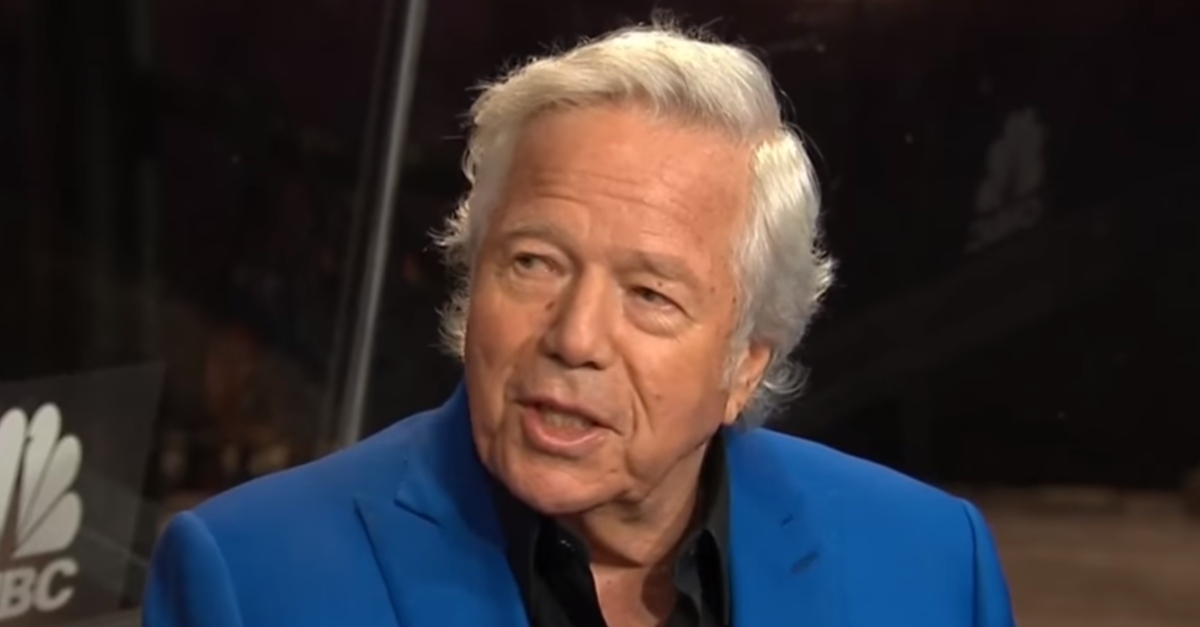
New England Patriots owner Robert Kraft got a huge win in court on Monday, as a judge decided to block a salacious spa video from being used as admissible evidence in his misdemeanor prostitution case.
Here are main takeaways from the ruling.
1. Spa Customers Had a Reasonable Expectation of Privacy, Judge Said
Kraft’s attorneys previously complained about investigators with the Jupiter Police Department obtaining a sneak and peek warrant to install secret cameras into the Orchids of Asia Day Spa.
“Far from having justification commensurate with the extraordinary invasions it perpetuated, law enforcement in this case had no authority whatsoever for something as drastic as ‘sneak and peek’ video surveillance, much less continuous, unbounded video surveillance of naked patrons in private licensed massage parlors,” they wrote in a filing obtained by Law&Crime.
Judge Leonard Hanser agreed. He pointed out that while this was in a private business–where Fourth Amendment protection is weaker than in a personal home–the defendant had a “reasonable, subjective expectation of privacy, as would anyone seeking a private massage in a commercial or professional setting, and that the activity in that room would remain private.”
He added later, “That Defendant may have been engaged in criminal activity is not material in determining whether society is prepared to recognize an objective expectation of privacy.”
2. “Serious Flaw”: Search Warrant Didn’t Adequately Address Minimization
Under case law, authorities had to follow minimization procedures for surveillance, but cops didn’t do that in a meaningful way, wrote the judge. In other words, how did law enforcement reduce their surveillance of legal behavior or anything that didn’t rise to the level of probable cause? For example, the warrant said that no cameras were to be put in the kitchen, bathroom, or personal bedrooms, but spa clients were unlikely to frequent those areas, and the warrant didn’t alleged criminal activity to be suspected in those areas, said the judge.
“Furthermore, the search warrant does not address how to minimize the impact of video surveillance on female Spa clients,” he wrote. All of allegations concerned male patrons. Hansers seemed to lean pretty heavy on how minimization, or the lack thereof, would affect female customers.
“Failing to consider and include instructions on minimizing the impact on women, through a highly intrusive law enforcement technique in a setting with a high legitimate expectation of privacy, is a serious flaw in the search warrant, especially considering that the search warrant did not allege women were seeking illegal contact,” he wrote. “The testimony indicates the videotapes of these individuals remain in the records of the Jupiter Police Department.”
3. No Evidence Allowed from the Traffic Stop
The judge also suppressed evidence from a January 19 traffic stop, which is said to have occurred after the defendant left the spa and was caught on surveillance video. According to cops, an officer pulled over a vehicle in which Kraft was the passenger and asked for the football honcho’s ID. The officer did not know who Kraft was until the stop, but was able to confirm his identity. The evidence garnered as a result of said stop was thrown out.
“All information obtained through the stop is suppressed as the fruit of an unlawful search,” Hanser wrote.
[Screengrab via CNBC]
Robert Kraft wins fight ove… by on Scribd
[Image via Kevin Winter/Getty Images]
Have a tip we should know? [email protected]